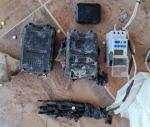You are here
Yemenis seek justice for 'unlawful' US drone strike killings
By AFP - Jan 29,2021 - Last updated at Jan 29,2021

Opposers of Yemen's Huthi rebels take part in a rally in support of the United States and the outgoing Trump administration's decision to apply the 'terrorist' designation to the Iran-backed movement, in Yemen's third city of Taez on Wednesday (AFP photo)
DUBAI — Two Yemeni families have filed a petition this week against the US government over the "unlawful" killing of 34 relatives, including nine children, in counter-terrorism operations, said human rights group Reprieve.
The families suffered enormous loss of life and property between 2013 and 2018 in six drone strikes and a special operations raid, said Reprieve, which submitted the petition to the Inter-American Commission on Human Rights on behalf of the families on Tuesday.
"It is averred that the seven attacks at issue have resulted in the unlawful killing of at least 48 people, including 17 children, and in the serious injury of at least seven others, as well as the destruction of their personal property and livelihoods," said the petition seen by AFP.
Of those killed, 34 were members of the Al Ameri and Al- Taisy families, who are requesting the commission urge the US government to take immediate measures to prevent further harm as it reviews the files -- often a long process that could take years.
The first strike, which took place in December 2013 under the administration of then-president Barack Obama, targeted a wedding procession convoy, killing at least 12 people, including seven Al Ameri family members and five people from the Al Taisy family, according to the filing.
A local security official at the time told AFP some of the dead were suspected members of Al Qaeda.
The Al Ameri and Al Taisy families deny any connection to the jihadist group.
The petition comes just days after US President Joe Biden took office and it puts the spotlight on America's long-running bombing campaign against Al Qaeda in the Arabian Peninsula (AQAP), on which the US rarely comments.
'Last resort'
According to analysts, AQAP's capabilities on the ground have largely diminished over the past decade, apart from a brief uptick of activity amid the ongoing war between the internationally recognised Yemeni government and Iran-aligned Huthi rebels that broke out in 2014.
Since the 2013 convoy incident, six other operations were carried out, all under Biden's predecessor Donald Trump, during whose administration the US stepped up its campaign in Yemen, according to US Central Command (CENTCOM) data published by US media.
"What the families are hoping for from the commission is first and foremost recognition of the harm that's been done to them," Jennifer Gibson, a lawyer with Reprieve, told AFP on Thursday.
"They've tried time and time again to engage the Yemeni and US governments to stop the strikes, and yet they've continued," she said.
"The commission, for them, is a last resort to try to put forward evidence to say 'you're making a mistake, whatever you think it is we've done, we've not done, please stop the strikes'."
The Biden administration signalled on Wednesday a fresh look at US policy in the Middle East.
Related Articles
Yemeni authorities have paid out tens of thousands of dollars to victims of drone strikes using US-supplied funds, a source close to Yemen’s presidency said, echoing accounts by legal sources and a family that lost two members in a 2012 raid.
ADEN/KUWAIT — Yemeni and Emirati troops advanced into the southern port city of Mukalla on Sunday, officials and residents said, entering a
ADEN — The United States on Sunday launched a new wave of air raids against Al Qaeda in Yemen, as extremists fled from towns being targeted
















